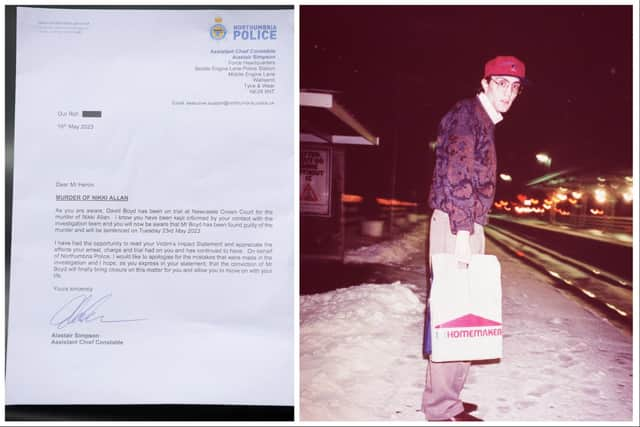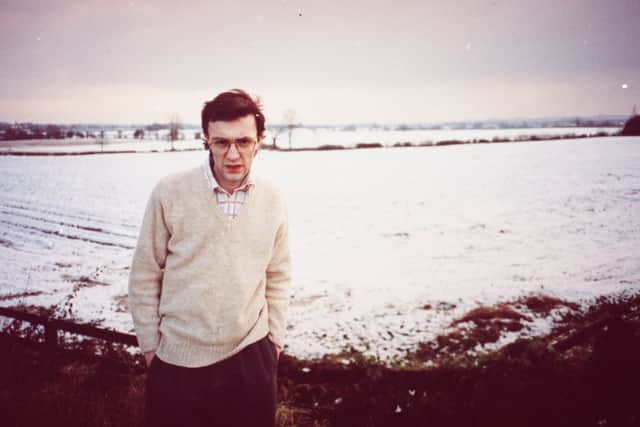The sad story of George Heron, the Sunderland man wrongly tried for Nikki Allan's murder
and live on Freeview channel 276
The conviction and sentencing of David Boyd for the brutal killing of Nikki Allan finally saw justice for her family more than 30 years on.
But they are not the only ones who have finally seen justice. Another man was tried and acquitted of the crime in 1993, and has had to live under a shadow ever since.


Advertisement
Hide AdAdvertisement
Hide AdGeorge Heron, then 24, lived near Nikki’s family in Wear Garth, having moved to the East End to live with his sister just weeks before Nikki’s murder.
Neighbours described him as a ‘weirdo and a loner’. Evidence linking to the crime included a knife discovered at his lodgings which matched Nikki’s wounds.
Blood splatters were found on his shoes and some clothing, and witnesses reported seeing a man fitting his description near the Boar’s Head and Clarendon pubs - despite him at first denying going out that evening.
Advertisement
Hide AdAdvertisement
Hide AdThe man was described as having been seen buying cheese-and-onion crisps, Nikki’s favourite flavour.
George’s sister reported he had spent half an hour washing himself in the bathroom, which was uncharacteristic.
From today’s standpoint, some of the evidence seems ludicrously circumstantial. Other evidence could be very easily either verified or dismissed with today’s forensic techniques and DNA testing.


In a statement released after Boyd was sentenced, George said he felt the original investigating officers had the chance over the years to ‘admit their mistakes’.
Advertisement
Hide AdAdvertisement
Hide Ad“When I was arrested and interviewed in October 1992, my DNA was taken and has been held on record since then,” he said.
“The police would have been able to check it against any new developments/advances in science.”
He added: “I don't understand why the original officers couldn't have admitted they made a mistake, apologised and looked at the case again - instead of having a blinkered view and not trying to put things right.”
A central plank of the prosecution case, however, was that after three days of police questioning, George confessed to the killing - having previously denied it 120 times.
Advertisement
Hide AdAdvertisement
Hide AdThe judge at his trial decided this should not be presented to the jury, as it was obtained ‘under duress’.
From the moment George was charged, his life - and that of his family - was turned upside down.
He was remanded in custody, and his family were moved elsewhere for their own safety as the mood in the community turned ugly.
George described how suspicions and lies not only about him, but about his family, circulated for decades.
Advertisement
Hide AdAdvertisement
Hide AdIndeed, members of his family died never seeing the real killer brought to justice - and George could not even pay his respects to them when they passed away.
“I lost what little honour and property I had as a result of being falsely accused of Nikki Allan’s murder,” he said in his statement, which was released as Boyd was sentenced.
“I have had to read and hear (both online and offline), malicious lies being spread about me and my family - some of whom are now deceased, and whose funerals I didn't get a chance to attend (in some cases, I didn't even find out about their deaths until months later).”
At his first appearance in the dock in 1993, at Sunderland Magistrates Court, George was subject to threats shouted from the public gallery.
Advertisement
Hide AdAdvertisement
Hide AdA man lunged forward to attack him as he was led away back to the cells, but was restrained by police. Outside, an angry crowd banged on the police van as George was taken back to prison. It was not the only violence to which he would be subjected.
Several more similar attempts were made to attack George when the case went to Leeds Crown Court for trial. While in prison on remand, he was slashed across the face by a fellow inmate. He was left with a scar. His solicitor’s office was also firebombed after the trial.
With no real eye-witnesses or DNA evidence, and George’s confession ruled as inadmissible, the case against him failed to convince the jury and the young man was released.
But he could not stay in Sunderland for his own safety. He was given a new identity and moved away from his home city forever.
Advertisement
Hide AdAdvertisement
Hide AdNikki’s family took their own civil action against Heron in 1994. In the civil courts, cases must only be proved on the ‘balance of probabilities’ rather than the ‘beyond reasonable doubt’ standard of proof needed in criminal cases.
George did not contest the civil case, and the court awarded Sharon Henderson, Nikki’s mother, £7,000 - though it is understood she never received any money.
Suspicion continued to hang over George in the years and decades following, with the change in the ‘double jeopardy’ law - which meant a person could not be tried twice for the same crime - leading some to speculate George could be tried again if new evidence came to light.
However, in the end, it was another neighbour, Boyd - just a year older than George at 25 at the time of the terrible crime - who was found guilty, 31 years later.
Advertisement
Hide AdAdvertisement
Hide AdIt was not only Nikki’s family who saw justice when Boyd was convicted and the case was finally closed.
George said the reinvestigation of the murder and Boyd’s trial had brought back terrible memories for him, but he added he was very glad to see Nikki’s family get justice.
“I feel sadness, disgust, anger, betrayal by people I expected to tell the truth (especially the original investigating officers),” he said.
“It is really difficult to put in words what I have felt since 1992 - going from trying to look out for my family to having my life flipped upside down.
Advertisement
Hide AdAdvertisement
Hide Ad“Nikki Allan’s murder destroyed so many people's lives - I am just one of those people.
“I could be angry about being unfairly treated from Day One, but this isn't about me - it is about getting the real truth out into the open, so her family (and what is left of mine) can have some closure and finally try to move on.
“I hope that people don't blame the present officers for the mistakes that were made in 1992/1993 - it is not their fault.
“It was probably as difficult for them reopening the case - and they should be given credit for the work they have done trying to get it solved.”